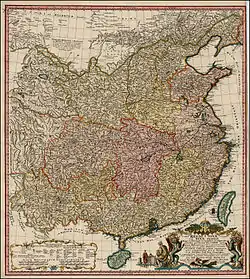Sinae
See also: sinä
Latin

An early modern Latin map after Ptolemy, showing SINÆ on the Great Gulf at the eastern end of the landlocked Indian Ocean.

An 18th-century Latin map of China Proper (Sinæ Propriæ).
Etymology
From Ancient Greek Σῖναι (Sînai) of uncertain etymology, but probably from Sanskrit चीन (cīna, “China”), possibly via Arabic اَلصِّين (aṣ-ṣīn, “China; the Chinese”) and usually held to derive from Old Chinese 秦 (*Dzin, “Qin”). See "Names of China" at Wikipedia.
Pronunciation
- (Classical) IPA(key): /ˈsiː.nae̯/
Proper noun
Sīnae f pl (genitive Sīnārum, locative Sīnīs); first declension
- (culture) The Chinese, specifically:
- (geography) The land of the Chinese, specifically:
- (Classical Latin) The land of the southern Chinese.
- (New Latin) China: the Republic or People's Republic of China.
Inflection
First declension.
| Case | Plural |
|---|---|
| Nominative | Sīnae |
| Genitive | Sīnārum |
| Dative | Sīnīs |
| Accusative | Sīnās |
| Ablative | Sīnīs |
| Vocative | Sīnae |
Synonyms
- (New Latin): Rēs Pūblica Populāris Sīnārum (People’s Republic of China), Rēs Pūblica Sīnārum (Republic of China)
Derived terms
- Rēs Pūblica Populāris Sīnārum
- Rēs Pūblica Sīnārum
- sīno-
This article is issued from Wiktionary. The text is licensed under Creative Commons - Attribution - Sharealike. Additional terms may apply for the media files.